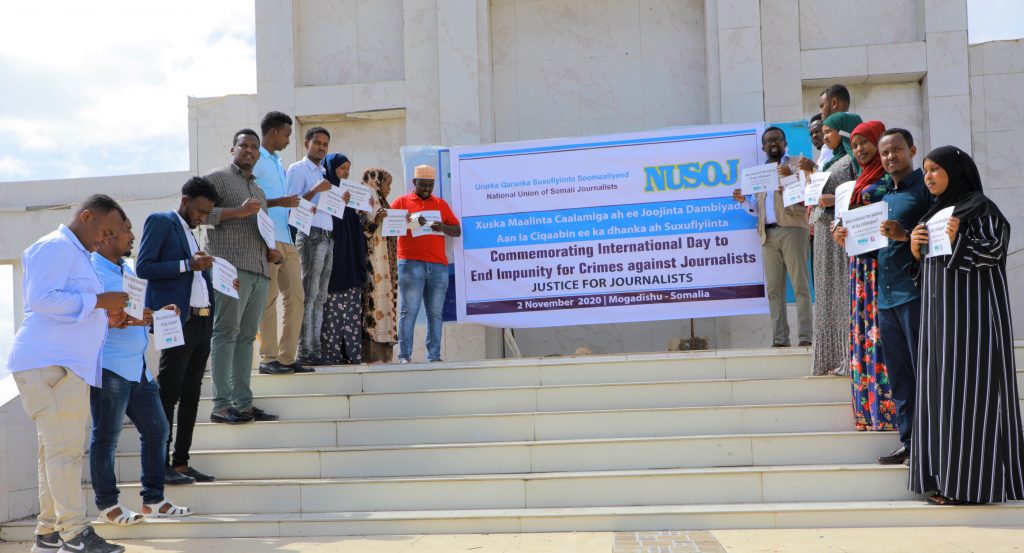The National Union of Somali Journalists (NUSOJ) has today commemorated the International Day to End Impunity for Crimes against Journalists (IDEI) by bringing together journalists at the national monument of Dhagah-Tur, a symbol of freedom and justice, to demand justice for journalists in unusual way.

This year’s commemoration is steeped in the possibility of real change as IDEI holds special resonance in Somalia because of the country’s appointment of a special prosecutor to investigate crimes against journalists in September 2020. This historic and strategic decision came about as a result of NUSOJ’s tireless campaigning and specifically, the union’s filing of legal action at Banadir Regional Court in Mogadishu as part of their work against impunity. In response to this legal action, the courts ordered the Office of the Attorney General to make the appointment.

NUSOJ believes that 2020 IDEI must be commemorated within this context and the historical move made. This year, NUSOJ calls for going beyond the routine statements condemning impunity, and is arguing that swift progress must be made to ensure the special prosecutor is able to fast track his responsibilities and take urgent judicial actions to end impunity. It is time for commitments to translate to real action and change.

NUSOJ has also been at the forefront of calling for changing Somalia's antiquated Penal Code. Several aspects of the Penal Code have been used to arrest and harass journalists. The decision by Somalia’s President to revise the Penal Code to ensure it cannot be used against journalists to curtain democratic freedoms, is encouraging and is further reason that recognition of IDEI is so important to contemporary political currents in Somalia.
IDEI is a reminder that impunity is the most sinister enemy to justice and to the realisation of media freedom in Somalia. This impunity, which Somalia has lived with for much too long, empowers perpetrators of the action and fosters the perpetuation of the practice. This in turn led to further decay of democratic and human rights principles.

“In essence, the failure to tackle the pervasive culture of impunity of crimes committed against journalists in Somalia decisively and courageously, in turn nurtures endless injustice that negates any hope for justice and human rights in Somalia,” says Omar Faruk Osman, NUSOJ’s Secretary General. “It’s a bitter cycle.”
Somalia still has a long way to go to eradicate the culture of impunity in society. Journalists continue to be detained, harassed and intimidated with the wheels of justice turning very slowly and actions against perpetrators woefully inadequate.

As a country that has seen 57 journalists killed in the last decade (two in 2020) and only four perpetrators brought to justice, Somalia is proof that impunity is a stubborn social problem that requires sustained efforts from a range of actors. Eradicating impunity is an essential component of stability in Somalia. Without tackling impunity of crimes committed against journalists, there can be no peace and freedom for journalists to live and operate. If journalists are unable to carry out their essential watchdog role and task of keeping the public informed, Somali society is poorer and weaker as a result.

Somalia has turned important social, economic and political corners in recent years. However, impunity for crimes against journalists continues to be a stain on the country’s image and a flagrant violation of the rights of journalists. 2020 has been a unique year for many reasons; it has been a year for reflection and change. In the same vein, IDEI 2020 must also be memorable as the moment when concrete actions were taken to change the culture of impunity in Somalia.

